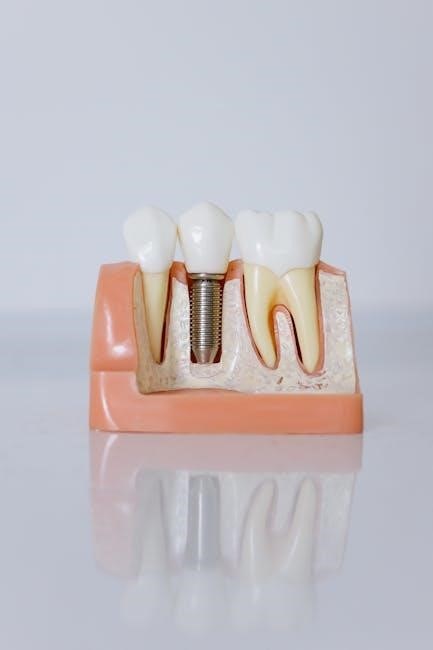Denture teeth molds are essential for creating lifelike and functional dentures, offering natural aesthetics and proper fit. They guide the selection and arrangement of teeth for optimal results.
Overview of Denture Teeth Molds
Denture teeth molds are standardized templates used to replicate natural teeth in dentures. They come in various sizes, shapes, and shades, catering to individual patient needs. Made from high-quality materials like PMMA, these molds ensure durability and aesthetics. Popular brands such as SR Vivodent, Portrait IPN, and Classic Mould Chart offer diverse options. Molds are categorized for complete or partial dentures, ensuring proper fit and function. Shade guides like VITA Classical and Bioform help in selecting tooth shades that match natural enamel, enhancing the final prosthesis’s appearance and patient satisfaction. These molds are crucial for achieving lifelike, functional results in denture fabrication.
Importance of Mold Selection in Denture Creation
Proper mold selection is critical for achieving both functional and aesthetic success in denture creation. Molds determine the size, shape, and shade of artificial teeth, directly impacting the wearer’s appearance and comfort. Accurate selection ensures natural-looking results, aligning with the patient’s facial anatomy and preferences. It also influences the durability and stability of the denture, preventing issues like uneven wear or poor fit. Ultimately, careful mold selection enhances patient satisfaction and the overall success of the prosthesis.
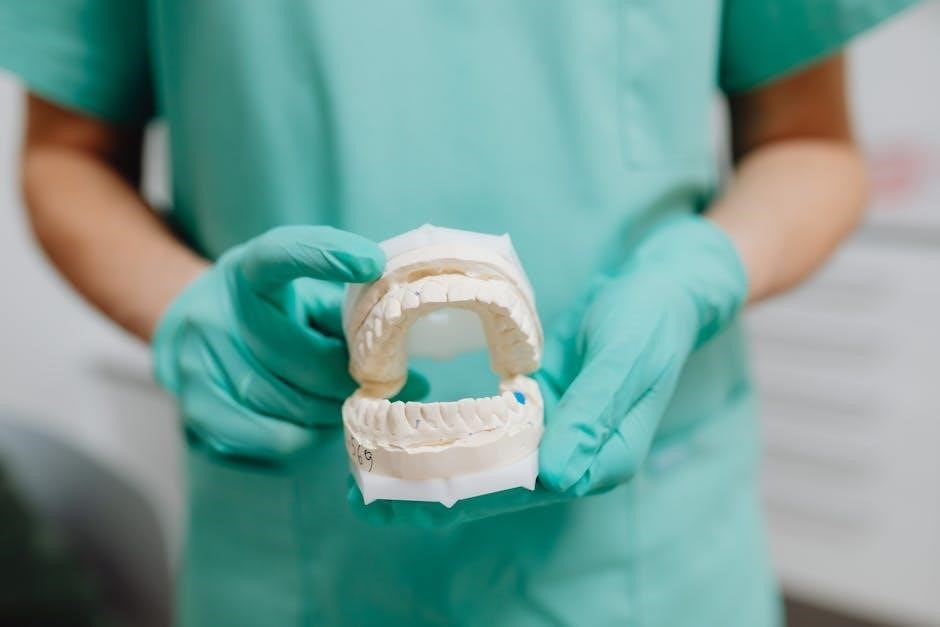
Types of Denture Teeth Molds
Denture teeth molds are categorized into complete, partial, and implant-supported types, each tailored to specific patient needs for optimal fit and functionality.
Complete Denture Teeth Molds
Complete denture teeth molds are designed for patients requiring full tooth replacement. They offer natural aesthetics and durability, with options like SR Vivodent and Portrait IPN teeth. These molds feature layered structures and materials that mimic real teeth, ensuring a lifelike appearance. Available in various shades, they cater to diverse patient needs, providing both functionality and comfort. Properly selected molds enhance chewing efficiency and facial harmony, making them a cornerstone in full denture creation.
Partial Denture Teeth Molds
Partial denture teeth molds are designed to replace missing teeth while blending seamlessly with natural teeth. They offer durability and aesthetic appeal, with options like SR Vivodent and Portrait IPN. These molds are available in various shades, ensuring a natural match. They are ideal for patients needing partial replacements, providing both functionality and comfort. Properly selected molds enhance chewing efficiency and facial harmony, making them a cornerstone in partial denture creation for optimal results.
Implant-Supported Denture Teeth Molds
Implant-supported denture teeth molds are specifically designed for stability and longevity, offering a secure fit for patients with dental implants. These molds are crafted to complement the natural aesthetics of the mouth while ensuring optimal functionality. They are often used in combination with high-quality teeth like SR Phonares II Lingual, which prioritize lingualized occlusion. Properly selected molds enhance chewing efficiency and facial harmony, making them ideal for both partial and complete implant-supported dentures. Their durability and natural appearance provide patients with a reliable and confidence-boosting solution.
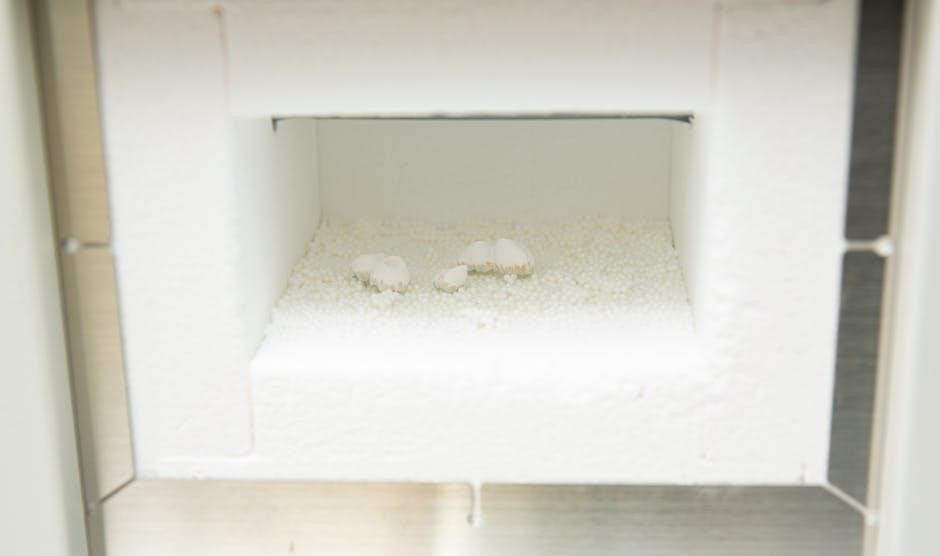
Shade Guides for Denture Teeth
Shade guides like VITA Classical and Bioform help select denture tooth colors, ensuring natural aesthetics. They offer standardized options and custom matching for precise patient-specific results.
VITA Classical Shade Guide
The VITA Classical Shade Guide is a widely used tool for selecting denture tooth shades, offering a standardized range of 16 shades (A1-D4). It provides a reference for matching tooth colors to natural dentition, ensuring aesthetic harmony. While not a perfect match, it serves as a reliable starting point for shade selection. Dental professionals rely on this guide to achieve natural-looking results, making it a cornerstone in denture creation and customization.
Bioform Shade Guide
The Bioform Shade Guide offers a comprehensive system with 24 shades, making it a popular choice in removable prosthodontics. It provides nuanced color options, enhancing the ability to match natural tooth hues. This guide is particularly valued for its precision in shade selection, ensuring natural aesthetics in denture creation. Its extensive range allows dental professionals to achieve highly individualized results, catering to diverse patient needs and preferences.
Custom Shade Matching Techniques
Custom shade matching involves advanced methods to ensure denture teeth blend seamlessly with natural teeth. Techniques include layering porcelain and using digital tools for precise color replication. Dental labs often employ expert technicians to manually adjust shades, achieving a natural look. This process surpasses standard guides, offering personalized solutions for unique patient needs. Custom matching is particularly useful for patients with distinct tooth colors or complex aesthetic requirements, ensuring optimal results and patient satisfaction.
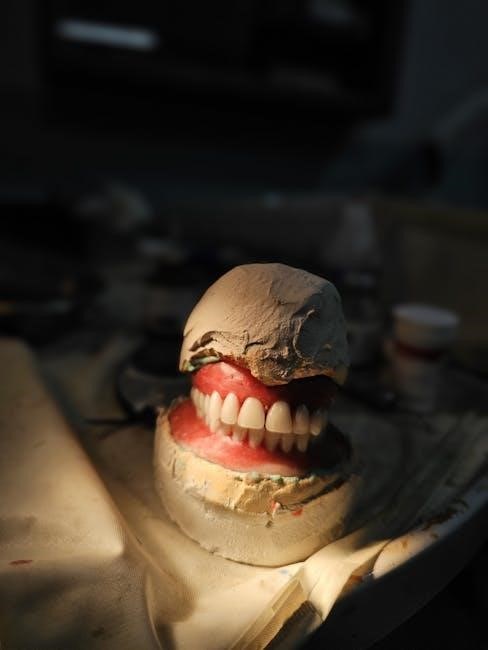
Denture Teeth Mold Selection Process
The selection involves evaluating patient anatomy, tooth size, and shade to ensure a natural appearance and proper fit, guided by expert techniques for optimal results.
Factors Influencing Mold Selection
Key factors include patient anatomy, facial form, tooth shade, and jaw size. Dental occlusion, budget, and lifestyle also play roles. Proper mold selection ensures natural aesthetics, comfort, and functionality, aligning with individual needs for optimal results.
Role of Facial Form and Anatomy in Mold Choice
Facial form and anatomy significantly influence denture mold selection. The shape of the face, jaw alignment, and natural tooth arrangement guide mold choice. Anterior teeth are selected based on facial symmetry, while posterior teeth must align with the jaw’s functional needs. The ATS philosophy emphasizes harmony between anatomical form and function. Understanding these elements ensures dentures complement the patient’s appearance and provide optimal chewing efficiency, blending natural aesthetics with functional occlusion for a personalized fit.
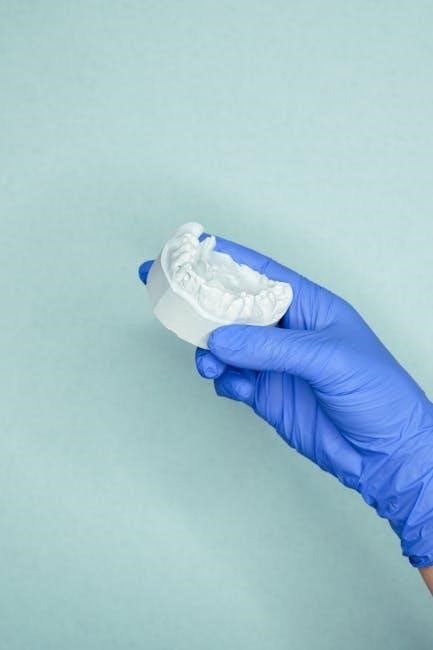
Advanced Fabrication Techniques
Modern denture fabrication leverages digital technologies and CAD/CAM systems for precise, customizable molds. These techniques enhance accuracy, efficiency, and patient satisfaction in denture creation.
Digital Denture Fabrication
Digital denture fabrication combines advanced CAD/CAM technology with precise 3D printing to create highly accurate and customized denture molds. This method ensures consistent quality and reduces production time.
By integrating digital impressions and virtual tooth arrangement, dentists can design molds that perfectly match patient anatomy. Digital systems also allow for easy adjustments and repetitions, enhancing overall satisfaction.
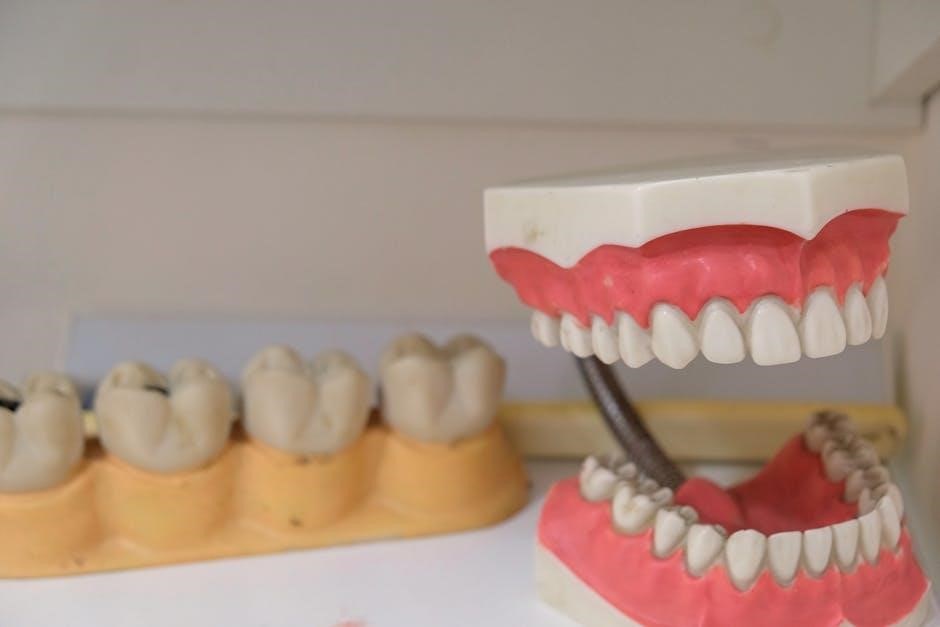
These innovative techniques are revolutionizing denture creation, offering superior fit, aesthetics, and durability compared to traditional methods, while maintaining affordability and accessibility for patients worldwide.
CAD/CAM Technology in Denture Mold Creation
CAD/CAM technology has transformed denture mold creation by enabling precise, high-quality designs. Digital tools allow for accurate tooth arrangement and customization, ensuring optimal fit and aesthetics.
This advanced method minimizes errors and reduces production time, while maintaining exceptional durability. CAD/CAM systems work seamlessly with high-quality materials, ensuring natural-looking results tailored to patient needs.
By integrating digital impressions and virtual modeling, CAD/CAM enhances the denture creation process, offering superior outcomes and patient satisfaction.
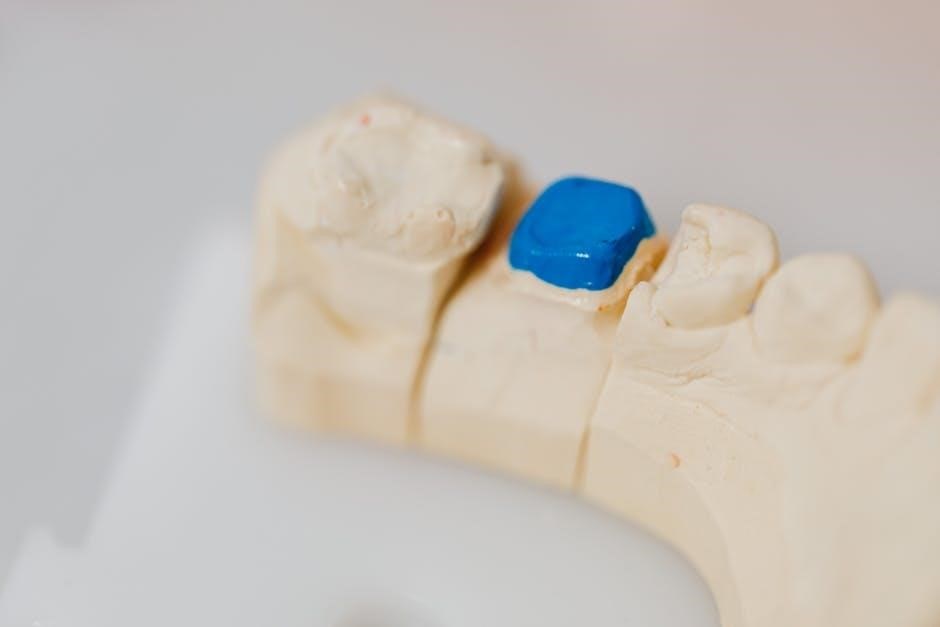
Popular Denture Teeth Brands
Leading brands like SR Vivodent, Portrait IPN, and Classic Mould Chart Teeth offer durable, aesthetically pleasing options, catering to diverse patient needs with advanced materials and designs.
SR Vivodent Teeth
SR Vivodent teeth are renowned for their high-quality materials and lifelike aesthetics. They feature a layered structure and precise shade matching, available in both PE and DCL options. These teeth are designed for durability and natural appearance, making them ideal for complete and partial dentures. Their compatibility with various shade guides ensures personalized solutions, catering to diverse patient needs while maintaining functionality and comfort.
Portrait IPN Teeth
Portrait IPN teeth are highly regarded for their exceptional durability and aesthetic appeal. Available in all 16 A-D shade designations and three bleach shades, they offer versatile options for natural-looking dentures. Their homogenous three-dimensional structure and cross-linking of molecular chains ensure long-lasting performance. These teeth are widely trusted by dental professionals for their quality and ability to meet patient needs, making them a popular choice for both complete and partial dentures.
Classic Mould Chart Teeth
Classic Mould Chart Teeth are known for their natural aesthetics and wide selection of moulds, catering to diverse patient needs. They offer a cost-effective solution without compromising on quality, making them ideal for budget-conscious patients. Available in popular shades, these teeth align with the VITA Classical Shade Guide, ensuring consistent color matching. Their durability and variety in shapes and sizes make them suitable for both complete and partial dentures, providing a reliable option for achieving lifelike and functional dental prosthetics.
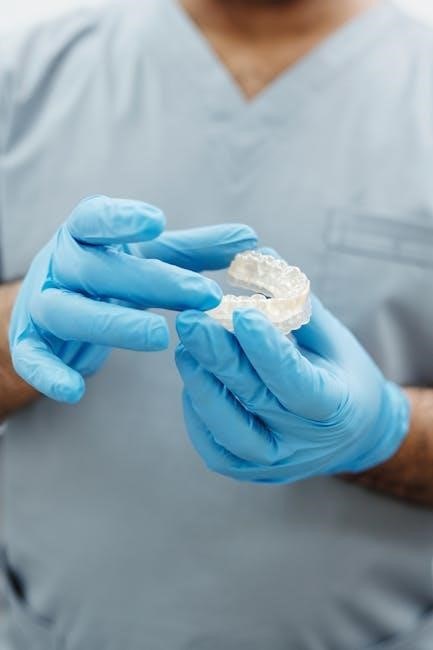
Denture Teeth Try-In and Adjustment
Denture try-in involves fitting trial teeth to ensure proper aesthetics and function. Adjustments are made to achieve optimal comfort, appearance, and fit, ensuring patient satisfaction.
Trial Denture Fitting Process
The trial denture fitting process involves using a wax mold to test the arrangement and fit of selected teeth. This step ensures proper aesthetics, function, and comfort. Patients try on the wax denture to assess appearance, bite alignment, and overall feel. Any necessary adjustments to tooth position, shade, or shape are noted. This iterative process allows for fine-tuning before finalizing the denture, ensuring a natural look and optimal performance. It’s a critical step in achieving patient satisfaction and functional success.
Final Adjustments and Customization
After the trial fitting, final adjustments are made to refine the denture’s fit, aesthetics, and function. Minor tweaks to tooth placement, bite alignment, and occlusion are common. The denture is polished for optimal comfort and appearance. Customization ensures the denture matches the patient’s facial anatomy and preferences. This step is crucial for achieving a natural look and ensuring long-term satisfaction. Final adjustments are tailored to individual needs, making the denture both functional and visually appealing.

Maintenance and Care of Denture Teeth Molds
Proper handling and storage of denture teeth molds are crucial for longevity. Clean with mild detergents, avoid harsh chemicals, and store in protective cases to prevent damage.
Proper Handling and Storage
Proper handling and storage of denture teeth molds are essential to maintain their integrity and longevity. Always clean molds with mild detergents and rinse thoroughly to prevent residue buildup. Avoid exposing them to harsh chemicals or extreme temperatures, as this can damage the material. Store molds in protective cases to prevent chipping or warping.
For optimal preservation, keep molds in a dry, cool environment away from direct sunlight. Regularly inspect for wear or damage and replace as needed. Proper care ensures molds remain accurate and functional for consistent denture fabrication results.
Cleaning and Sanitization Techniques
Cleaning and sanitizing denture teeth molds are critical steps to maintain their quality and prevent contamination. Use mild detergents and soft-bristle brushes to gently remove debris without damaging the surfaces. Avoid abrasive materials or harsh chemicals that could alter mold dimensions or texture.
Sanitize molds using ultrasonic cleaners or enzymatic solutions, followed by thorough rinsing. Avoid autoclaving or using bleach, as these can degrade materials. Proper drying and storage in sealed containers prevent moisture buildup and bacterial growth, ensuring molds remain precise and safe for reuse.
Denture teeth molds are vital for creating functional and aesthetically pleasing dentures, ensuring proper fit and natural appearance. Advanced technologies and proper care enhance their longevity and performance.
Future Trends in Denture Teeth Molds
Future trends in denture teeth molds emphasize digital dentistry, with CAD/CAM technology enabling precise, customized designs. 3D printing is expected to revolutionize mold creation, offering faster production and enhanced accuracy. AI-driven tools will aid in predicting optimal tooth arrangements and shades, improving aesthetics. Biocompatible materials and implant-supported solutions will gain prominence, ensuring durability and comfort. These advancements promise to make dentures more lifelike, functional, and tailored to individual patient needs, setting new standards in prosthodontics.
